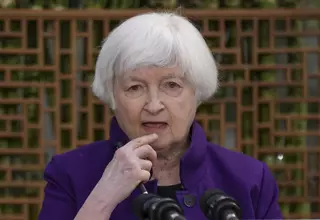Breathe Easy: Nose Shape Influenced by Local Climate

Washington. The human nose, in all its glorious forms, is one of our most distinctive characteristics, whether big, little, broad, narrow or somewhere in between. Scientists are now sniffing out some of the factors that drove the evolution of the human proboscis.
Researchers said on Thursday (16/03) a study using three-dimensional images of hundreds of people of East Asian, South Asian, West African and Northern European ancestry indicated local climate, specifically temperature and humidity, played a key role in determining the nose's shape.
Wider noses were more common in people from warm and humid climates, they found. Narrower noses were more common in those from cold and dry climates.
The nose's primary functions are breathing and smelling. It has mucous and blood capillaries inside that help warm and humidify inhaled air before it reaches more sensitive parts of the respiratory tract.
Having narrower nasal airways might help increase contact between inhaled air and tissues inside the nose carrying moisture and heat, Penn State University geneticist Arslan Zaidi, lead author of the study published in the journal PLOS Genetics, said.
"This might have offered an advantage in colder climates. In warmer climates, the flip side was probably true," Zaidi said.
Our species appeared in Africa about 200,000 years ago and later migrated to other parts of the world. The researchers said people with narrower nostrils may have done better and produced more offspring than those with wider nostrils in colder, drier locales, driving a gradual decline in nose width.
The finding generally supports what's called Thomson's rule, formulated by British anatomist and anthropologist Arthur Thomson (1858-1935), that people from cold, dry climates tend to have longer and thinner noses than people from warm, humid climates.
Zaidi said most previous evidence regarding Thomson's rule came from skull measurements, while this study expanded on that by analyzing external nose shape.
The researchers studied nose width, nostril width, nose height, length of the nose ridge, nose tip protrusion, external surface area and total nostril area.
"What we have tested is a very simple hypothesis about the nose, which likely had a very complex evolutionary history. There's a lot we don't know," Zaidi said, citing the need to probe genes underlying nose shape.
"One can imagine how cultural differences in attractiveness could have led to some of the differences in nose shape between populations. For example, were wider noses considered more attractive in some populations relative to others?"
Reuters
Tags: Keywords:POPULAR READS
Yellen Says Iran's Actions Could Cause Global 'Economic Spillovers'
Iran's missile attack on Israel early Sunday came in response to what it says was an Israeli strike on Iran's consulate in Syria.Prabowo Camp Cites ‘Procedural Error’ in Legal Challenge by Rival Candidates
The Constitutional Court's main task is to address alleged discrepancies in vote tallies, which neither of the plaintiffs challenged.Apple Wants to Increase Investments in Vietnam
Vietnam has become more important to Apple as the company seeks to diversify its supply chains away from China.China’s Top Diplomat Wang Yi to Visit Indonesia for Cooperation Talks
Chinese top diplomat Wang Yi will chair a policy coordination meeting aimed at strengthening Indonesia-China cooperation.President Jokowi Urges Global Restraint as Tensions Rise in the Middle East
President Joko "Jokowi" Widodo emphasized the importance of diplomatic efforts to prevent the escalation of conflict in the Middle EastPopular Tag
Most Popular






















